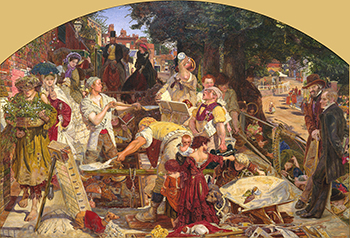"on-demand economy" entries

Leah Busque and Dan Teran on the future of work
The O'Reilly Radar Podcast: Service networking, employees vs contractors, and turning the world into a luxury hotel.
Subscribe to the O’Reilly Radar Podcast to track the technologies and people that will shape our world in the years to come.

In this week’s Radar Podcast episode, O’Reilly’s Mac Slocum delves into the economy with two speakers from our recent Next:Economy conference. First, Slocum talks with Leah Busque, founder of TaskRabbit, about service networking, TaskRabbit’s goals, and issues facing the peer economy. In the second segment, Slocum talks with Dan Teran, co-founder of Managed by Q, about the on-demand economy and the future of work.
Here are a few highlights from Busque:
As a technologist myself, I became really passionate about how we mash up social and location technologies to connect real people, in the real world, to get real things done. I’d say in the last two years, it’s become real time, and that’s really the idea about where service networking was born.
It’s certainly our job to create a platform where demand is generated so that our tasker community, our suppliers, can find work, but I think even more than that, it is about building a platform and tools for our taskers to build out their own businesses.

Improving Uber’s surge pricing
Should algorithmic pricing be the norm rather than the exception?

Request an invitation to Next:Economy, our event aiming to shed light on the transformation in the nature of work now being driven by algorithms, big data, robotics, and the on-demand economy.
Companies want a bigger share of the pie than their competitors, capital wants a bigger share than labor (and labor wants right back), countries want a bigger share than their rivals, but true wealth comes when we make a bigger pie for everyone. Well run markets are a proven way to do that.
Surge pricing is one of Uber’s most interesting labor innovations. Faced with the problem that they don’t have enough drivers in particular neighborhoods or at particular hours, they use market mechanisms to bring more drivers to those areas. If they need more drivers, they raise the price to consumers until enough drivers are incented by the possibility of higher earnings to fill the demand. Pricing is not set arbitrarily. It is driven algorithmically by pickup time — the goal is to have enough cars on the road that a passenger will get a car within 3–5 minutes. (Lyft’s Prime Time pricing is a similar system.) Uber keeps raising the price until the pickup time falls into the desired range.
This is clearly an imperfect system. In one case, surge pricing gouged customers during a crisis, and even in more prosaic situations like bad weather, the end of a sporting event, or a holiday evening, customers can see enormous price hikes. This uncertainty undercuts the fundamental promise of the app, of cheap, on-demand transportation. If you don’t know how much the ride will cost, can you rely on it?

A world of continous partial employment
Managers and workers benefit when both have access to data and control.

Request an invitation to Next:Economy, our event aiming to shed light on the transformation in the nature of work now being driven by algorithms, big data, robotics, and the on-demand economy.
Our future workplaces are increasingly managed by apps and algorithms. Is technology empowering workers, or making them ever more helpless cogs in a corporate profit machine?
When we talk about the “on-demand economy,” we are really talking about two things: the ability of a consumer to summon a vehicle, their lunch, or their groceries with the touch of an app or a few words to Siri, Cortana, or Google Now; and the lives of the workers who respond to those summons. Instant on-demand consumer services mean workers must also be available on demand.
As Logan Green of Lyft noted, his company provides “transportation as a service.” Perhaps the more general point is that it provides labor as a service. At least for now, the car comes with a driver.
Companies such as Lyft, Uber, TaskRabbit, Postmates, Upwork (and too many other new startups to count) all depend on a large pool of workers who make no set work commitments, who are bound to no schedule, but simply turn on an app when they want to work, and compete with other workers for whatever jobs are available.
These apps have gotten a lot of attention. But focusing that attention merely on “Next Economy companies” misses many of the deeper changes in the labor economy.

The rise of networked platforms for physical world services
A look at the huge economic shift led by software and connectedness.

Request an invitation to Next:Economy, our event aiming to shed light on the transformation in the nature of work now being driven by algorithms, big data, robotics, and the on-demand economy.
One of the themes we’re exploring at the Next:Economy summit is the way that networks trump traditional forms of corporate organization, and how they are changing traditional ways of managing that organization. Uber and Airbnb are textbook examples of this trend. Uber has ambitious plans to manage hundreds of thousands — eventually even millions — of independent drivers with a small core of employees building a technology platform that manages those workers. Airbnb is on track to have more rooms on offer than large hotel chains, with under a thousand employees.
Esko Kilpi beautifully described the power of networks in an essay on Medium, The Future of Firms, reflecting on economist Ronald Coase’s theory of 20th century business organization. He wrote:
The existence of high transaction costs outside firms led to the emergence of the firm as we know it, and management as we know it. … The reverse side of Coase’s argument is as important: if the (transaction) costs of exchanging value in the society at large go down drastically, as is happening today, the form and logic of economic and organizational entities necessarily need to change! The core firm should now be small and agile, with a large network.
The mainstream firm, as we have known it, becomes the more expensive alternative. This is something that Ronald Coase did not see coming. Accordingly, a very different kind of management is needed when coordination can be performed without intermediaries with the help of new technologies. Apps can do now what managers used to do.[Bolding mine.]
Today, we stand on the threshold of an economy where the familiar economic entities are becoming increasingly irrelevant. The Internet and new Internet-based firms, rather than the traditional organizations, are becoming the most efficient means to create and exchange value.

The WTF economy is transforming how we do business
Our Next:Economy event aims to inspire industry leaders to rebuild the economy by solving the hard problems.
Request an invitation to Next:Economy, our event aiming to shed light on the transformation in the nature of work now being driven by algorithms, big data, robotics, and the on-demand economy.
WTF?! In San Francisco, Uber has 3x the revenue of the entire prior taxi and limousine industry.
WTF?! Without owning a single room, Airbnb has more rooms on offer than some of the largest hotel groups in the world. Airbnb has 800 employees, while Hilton has 152,000.
WTF?! Top Kickstarters raise tens of millions of dollars from tens of thousands of individual backers, amounts of capital that once required top-tier investment firms.
WTF?! What happens to all those Uber drivers when the cars start driving themselves? AIs are flying planes, driving cars, advising doctors on the best treatments, writing sports and financial news, and telling us all, in real time, the fastest way to get to work. They are also telling human workers when to show up and when to go home, based on real-time measurement of demand.The algorithm is the new shift boss.
WTF?! A fabled union organizer gives up on collective bargaining and instead teams up with a successful high tech entrepreneur and investor togo straight to the people with a local $15 minimum wage initiative that is soon copied around the country, outflanking a gridlocked political establishment in Washington.
What do on-demand services, AI, and the $15 minimum wage movement have in common? They are telling us, loud and clear, that we’re in for massive changes in work, business, and the economy.
